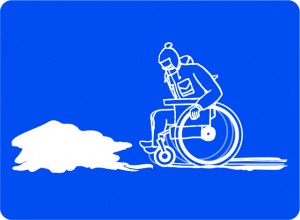MRU sidewalks impassable
Snow removal critical for those in wheelchair
Samara Hawkins
Features Editor
Remember looking out the window in elementary school, seeing a blanket of snow and thinking, “I hope it’s a snow day so I don’t have to go to school”?
Snow days are an indicator of youth, and as we get older, we develop a dislike for the snow. Shoveling sidewalks, icy roads and parking bans are all part of living in Calgary.
For fourth year marketing student Evan Shaw, who has used a wheelchair since he was eight years old, even a fine dusting of flakes on the ground might mean the difference between getting to class or staying in residence because the sidewalks have become inaccessible.
The 21-year-old has been living in west residence for the past four years, because it normally makes his commute to and from classes painless. “I didn’t have to take the bus, I didn’t have to get a ride from my mom, I didn’t have to use the handi-bus,” Shaw said.
But when it snows, Shaw’s regular two-minute downhill commute to class turns into a 10 or even 15-minute trek.
The problem isn’t just the snow, but the method in which the snow is removed. Sometimes only an inch of packed-down snow in the mornings make the sidewalks treacherous, as Shaw’s wheelchair’s wheels are designed for flat, smooth surfaces.
By the time Shaw’s classes are done the ramps and sidewalks are cleared, so when he’s homeward bound there are usually no issues with the snow.
Shaw is unsure of whether it’s the speed of snow removal, or the technique that the grounds department at Mount Royal University employs. The sidewalk sweepers miss the ramps, and street plows create ridges of snow that are impassible to any- one with limited mobility.
When The Reflector contacted the grounds department for information about the snow removal process, they declined to comment.
Sometimes, when the trip to Shaw’s 8 a.m. marketing classes looks possible, he gets the assistance of his friend who has a motorized wheelchair. “He tries to pull me through (the snow) sometimes, and I’ve fallen on my face before — in the snowbank. I’ve had to just chill on the ground and wait for somebody to ask if they can pick me up,” he said.
Shaw’s mother, who lives in the neighbouring community of Altadore, will sometimes drive from her home to pick up Shaw and drive him from West Residence to the Bissett School of Business.
“She carries a snow shovel in the back of her van and shovels places, because she knows how I’m going to get home,” Shaw said. “So she parks and shovels. People come up to her and ask, ‘Oh, how’d you get this horrible job?’ and she’s like, ‘I didn’t get this job, my son is disabled and there’s no shoveling, so I do it.”
Despite Shaw’s troubles with getting to class in the winter, he doesn’t blame the grounds department.
“I feel like if you are an able-bodied person, you don’t think like a disabled person,” he said. “Disabled people have to think differently every day. They have different challenges and moguls that are so small to able-bodied people. It’s not ignorance, they’re probably just do not realize.”







Interesting. I’d be stoked to hear more about what people using wheelchairs think of campus accessibility. But FYI, not ALL people develop a dislike for snow as we get older.